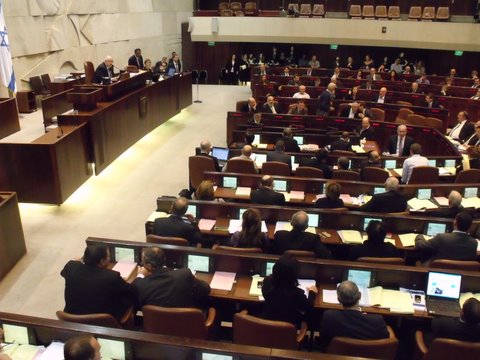The three most important bills of the 19th Knesset are expected to come up for their third readings this month, before Knesset goes on recess March 19th. The National Referendum Bill, The Haredi Draft Bill and The Electoral Reform Bill are expected to all pass. Each one of these bills will have a big impact on the country. What is in each bill, what is not in each bill? KnessetJeremy is planning to return to its 18th-Knesset format and give you a summary of each MKs speech in the plenum. It should be a lot of fun.
Jeremy


thanks Jeremy! i look forward to your summaries.
I agree with the Electoral Reform Bill except in one point, rise the electoral treshold. See this news of Maariv:
“העלאת אחוז החסימה תעזור למפלגות הערביות”
How will improve governance in Isarel changing three Arab parties with 4-3-3 MK `s for one arab party with 16-17 MK´s (second or third largest party in the Knesset)?
i do not know hebrew so i cannot read the article. what does it say?
and why should one think that the arab parties could be able to merge?
gm,
The article says that if the threshold is raised the Arabs parties will be joined in a single list, and in that case it is estimated and increase of voter turnout in árab sector, so they could get 16-17 MK’s.
Have no doubt that if the alternative is to stay out of the Knesset or join in a united list they will do the second. They have already said that they will do:
http://www.haaretz.co.il/news/politi/1.2264977
1 – Just because Haaretz says something doesn’t mean it is going to happen. They are usually quite bad at guessing games.
2 – They use quotes from the two guys who stand to lose the most. The Jewish MK Khnenin who would be sent home and the leader of the 3-seat Balad Party. They also quote MK Tibi who has been pushing for an all-arab list.
3 – The threshold is being raised to 3.25% which is 4 seats. 10 of the 12 Knesset parties (including Hadash and Ra’am-Ta’al) have 4 seats or more. Only Balad (3 seats) and Kadima (2 seats) would be under the new threshold. So you can see Hadash and Ra’am-Ta’al have no reason to join forces, they pass on their own. Balad will most likely have to join forces with one or the other, or face the new threshold.
4 – I have not seen poll data that suggest a single-arab list would see an increase in votes. In fact I know many Jewish Hadash voters that would not vote for a list with MK Zoabi in it.
5 – The politicians can predict a bunch of seats if they want. Mergers don’t always work. Likud Beitenu was supposed to bring 50 seats, instead they got 31.
1) One thing, in the last election Ra’am-Ta’al get 3.65% and 4 MK´s. Hadash won 4 MK´s but 2.99%, so under de 3.25%. Ra’am-Ta’al don´t need to join forces but Hadash will have to do it.
Diferent posibilities:
a) One arab list: Ra’am-Ta’al + Balad + Hadash
b) Ra’am-Ta’al one list and Balad + Hadash another
c) Ra’am-Ta’al + Balad in one list and Hadash + Meretz another.
2) About polls data that suggest a single-arab list would see an increase in votes is http://www.nrg.co.il/online/1/ART2/551/181.html?hp=1&cat=404.
1) Ra’am-Ta’al cleared 3.4% in 2009 elections. They have been steadily going up in recent elections.
Hadash had 3.3% in 2009 elections. The unpopular move among party activists of veteran MKs overstaying their welcome through central committee power-playing is a factor as to why they went down to 3% in 2013. At least 2 of Hadash’s 4 MKs won’t be seeking re-election and I don’t see a reason why they can’t go back to their 2009 numbers.
I can’t see Meretz and Hadash joining forces.
2) That poll didn’t check numbers of the mandates with and without a higher threshold, which is what you need to produce a scientific result.
Additionally, it is hard for me to believe polls that do not come from one of the big 9 companies. Honestly, even among the 9 companies there are those that I doubt sometimes. Polling is a science.
why not raise the threshold to 4% as originally planned? that would be much easier then have to figure out the number 3.25 (- why not 3.3 or 3.2)
As expected discussion in the committee over the past month caused the coalition to soften their position.